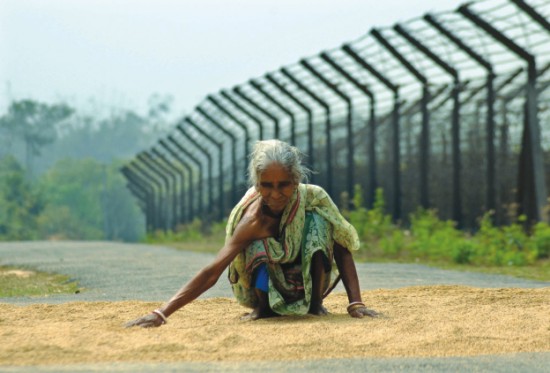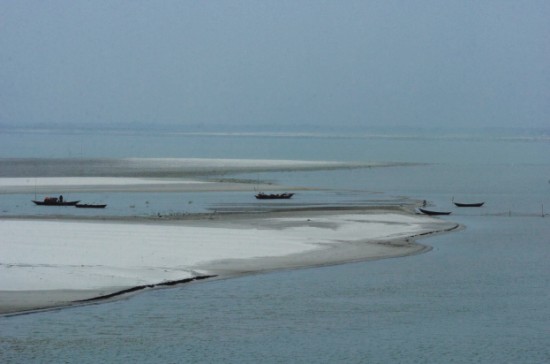
Inside
|
The Key Issue We need to ask for undiminished river flow, argues Nazrul Islam
It is a welcome development that the relationship between Bangladesh and India is expected to have turned for the better following Prime Minister Sheikh Hasina's recent India visit. It has been reported that trust has been re-established as a result of the goodwill measures taken by Bangladesh in response to India's security and economic needs pertaining to her North-Eastern states. The question that many are discussing is how India should reciprocate these goodwill measures of Bangladesh. Many suggestions have been made. We argue here that the most important way in which India can reciprocate Bangladesh's goodwill steps is by restoring and ensuring undiminished flows of the shared rivers. Given her geography, the most important bilateral relationship for Bangladesh is the relationship with India. And, among all the different bonds that Bangladesh and India have, rivers provide the most important bond. Almost all of Bangladesh's major rivers enter her territory via India. As the upper riparian country, India therefore holds over Bangladesh an enormous leverage, which she has been using to her advantage. The most damaging for Bangladesh has been river flow diversion, which violates Article 7 (obligation not to cause significant harm) of the 1997 UN Convention on the Law of the Non-Navigational Uses of International Watercourses. This article clearly says that: "Watercourse states shall in utilizing an international watercourse in their territories take all appropriate measures to prevent the causing of significant harm to other watercourse states." There is hardly any doubt that diversion of river water by Farakka, Gozaldoba, and other such structures constructed by India has caused "significant harm" to Bangladesh's ecology and economy. Now that goodwill has been restored, Bangladesh should ask for the undiminished flow of rivers, instead of negotiating for a "share" of the river flow. Restoration and ensuring undiminished flow of rivers is in the long-term interest of India as well. First, diversionary structures erected by India have proved to be of very limited benefit for India, particularly in view of the opportunity cost of resources spent. Second, unless undiminished flows can be restored, rivers of Bangladesh will not be navigable enough to make the connectivity provisions of the recent agreements fruitful, frustrating India's intention to ease transportation of good to and from her North-Eastern states. Third and most important, India must restore undiminished river flow in order to thwart the risk she faces from population displacement that may occur in Bangladesh due to climate change. Sedimentation has been historically the most effective protection for the Bengal delta against sea level rise. Diminished river flow cause sediment volume to decrease, making Bangladesh vulnerable to the submergence effect of climate change. By restoring full volume of river water and thereby of sediment flow, India can help Bangladesh counter sea level rise and thus avoid the threat of large-scale migration. Responses The very geography of Bangladesh suggests that she needs to have good relationship with India in order to prosper. History also points to the same conclusion. After all, India's help was crucial for the success of Bangladesh Liberation War. Unfortunately, over the years, the relationship between Bangladesh and India turned from bad to worse. India complained that Bangladesh territory was being used for supporting subversive activities in North-Eastern states of India. While Bangladesh had been denying such activity, the ten-truck arms haul incident, and similar other incidents, have shown clearly that the Indian complaint has considerable basis. The main outcome of the Hasina visit has been expression of Bangladesh's unequivocal commitment to stop any such subversion or insurgency abetting activities. Broadly, this stand applies to all types of terrorist and criminal activities. The commitment has been reciprocated by India, resulting in the agreements signed during the visit. This commitment and resulting agreements have taken away the main strategic barrier that was obstructing the Indo-Bangladesh relationship. The step has established goodwill and a level of trust that can now exert positive influence on other spheres of Indo-Bangladesh relationship. Another important development during the visit has been expression of Bangladesh's willingness to allow her ports for use by neighbouring countries, not only India, but Bhutan and Nepal as well. By doing so, Bangladesh has conceded to another important Indian wish, namely alleviation of the semi-land locked situation of her North-Eastern states. The question many have asked is what Bangladesh has gained in return to these steps. On the issue of security, the commitment is mutual, so that the question of additional gain to be had by Bangladesh in a sense may not apply. However, many have seen the Indian offer of $1 billion credit and the opportunity to buy electricity from her as indirect reciprocal steps. On the issue of use of ports, the question of Bangladesh's gain is a genuine one, because after all it is predominantly an economic issue. However allowing ports for use by other countries of the region can be a mutually advantageous step for Bangladesh too. From being national sea ports of Bangladesh, Chittagong and Mongla can now become regional ports, enjoying many benefits of entrepot trade, as do Hong Kong, Singapore, and other such regional ports. The regional status can be particularly helpful for Mongla, which is generally regarded as underutilised. Of course, Bangladesh has to carefully negotiate the modalities of use her ports by neighbouring countries, so that her legitimate interests are protected and due expected economic gains are maximised. However, many are not satisfied with the above. They think that Bangladesh should get more from India in return for her cooperation in meeting India's security and economic needs. They have put forward many additional demands, the important among which are: (i) removal of tariff and non-tariff barriers to Bangladesh export to India, (ii) halt to killing of Bangladeshis by Border Security Force (BSF) of India, (iii) transit facility to Nepal and Bhutan, etc. These are justifiable demands that Bangladesh should indeed put forward to India and press upon. The joint communique suggests that Bangladesh has raised these issues, and negotiations are continuing towards reaching outcomes satisfactory to both sides. Undiminished River Flow What is however necessary is for Bangladesh to adopt a completely different stance on the issue of rivers. Now that Bangladesh has secured the goodwill of India by taking steps with regard to security and connectivity, a favourable situation has arisen for Bangladesh to make this stance more prominent and to ask for India's agreement to it. Instead of asking for a part of the river flow, which negotiations on "sharing of the rivers" imply, Bangladesh needs to ask for "undiminished river flow." Bangladesh can justify this stance on the ground of her rights to "prior and customary use" of the river flow. The international norms and conventions with regard to trans-boundary rivers support this right. India very well knows that the entire economy, society, and culture of Bangladesh have developed over thousands of years based on flows of the rivers that pass through her. Any diminution of these flows violates Bangladesh's inalienable rights on her rivers. India has done similar injustice to Bangladesh by diverting Teesta flow through its Gazaldoba barrage. It is of utmost concern that India has similar diversionary plans with respect to other common rivers. Just as the security threat was poisoning Indo-Bangladesh relationship from Bangladesh side, so is the water diversion poisoning this relationship from India's side.
Just imagine how electrifying the effect on Bangladesh people's attitude toward India and thereby on Indo-Bangladesh relationship would be if India announced that it would decommission Farakka barrage! Yet, such a proposition is not unreasonable at all. Since 1974, Farakka has been in operation for 36 years now. The experience has shown that Farakka has not brought much benefit for India (West Bengal). It has not qualitatively changed the port situation of Kolkata. On the other hand, Farakka has become a source of flooding in many parts of Bihar and West Bengal. More importantly, Farakka has led the Ganges to change its course so that it is likely that in future the river will completely bypass the barrage making this huge structure redundant. That being the case, is it not advantageous for India to do what nature seems to be already set to do, and yet derive the dividends in terms of further warming her relationship with Bangladesh? The same may be said with regard to Gozaldoba barrage, which though relatively new, but will also have similar fate as Farakka. Enhanced Connectivity Rivers provide the cheapest way of transporting goods, particularly the bulky ones. Year round navigable rivers are also necessary for the east-west transportation of goods. Yet, diminished flows have already reduced navigability of Bangladesh rivers, and the navigability will shrink further if India goes ahead with other planned diversionary structures. Hence, restoration and ensuring of undiminished flow is in the interest of India from the viewpoint of more fruitful connectivity of her North-Eastern states. Climate Change One of the most important protections that Bangladesh has against submergence is land accretion through sedimentation caused by river flow. About 2 billion tons of sediment used to be carried by rivers into Bangladesh. Unfortunately, this sediment volume is decreasing due to India's diversion of river flows. By stopping such diversion, India can restore the flow of sediment, which upon better management by Bangladesh can allow her to counteract the sea level rise due to global warming.
Conclusion Other things, such as trade opportunities, are important, but not as important as river flow. Trade is something that Bangladesh can do with other nations too. But, for undiminished river flow, Bangladesh has only India to turn to. Undiminished river flow is the most important thing that Bangladesh can ask from India in return for her goodwill gestures and steps. If there has to be any quid pro quo, here is the quo. Dr. Nazrul Islam is the Global Coordinator of Bangladesh Environment Network (BEN) and Vice President of Bangladesh Poribesh Andolon (BAPA).
|


